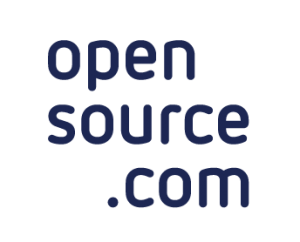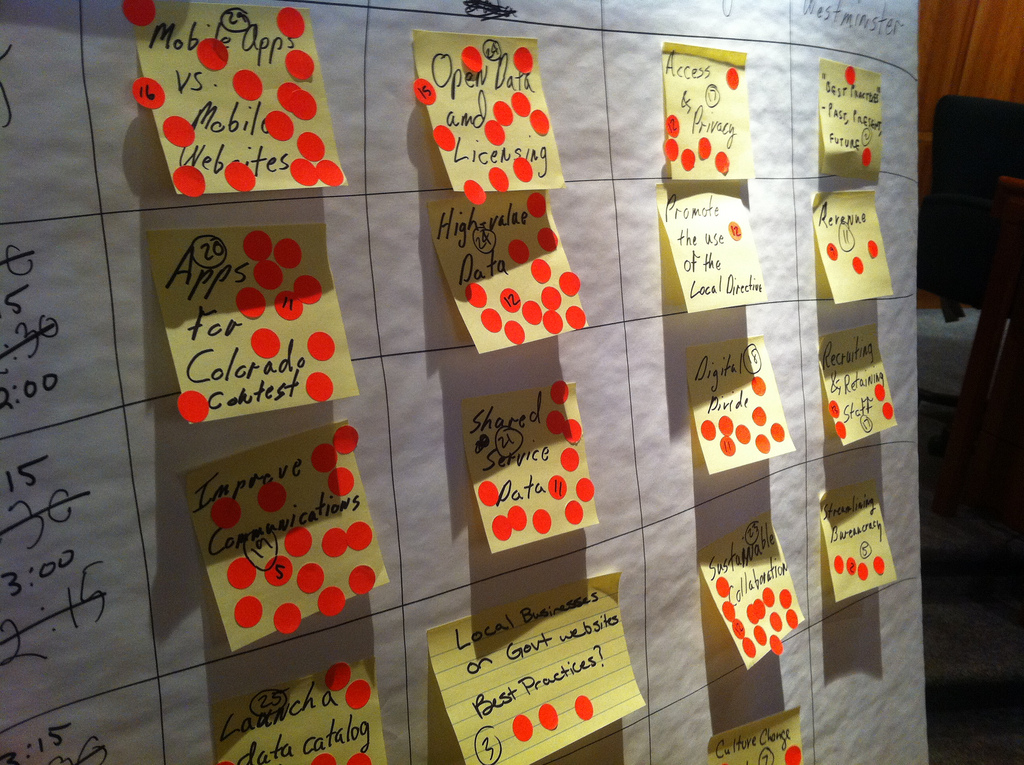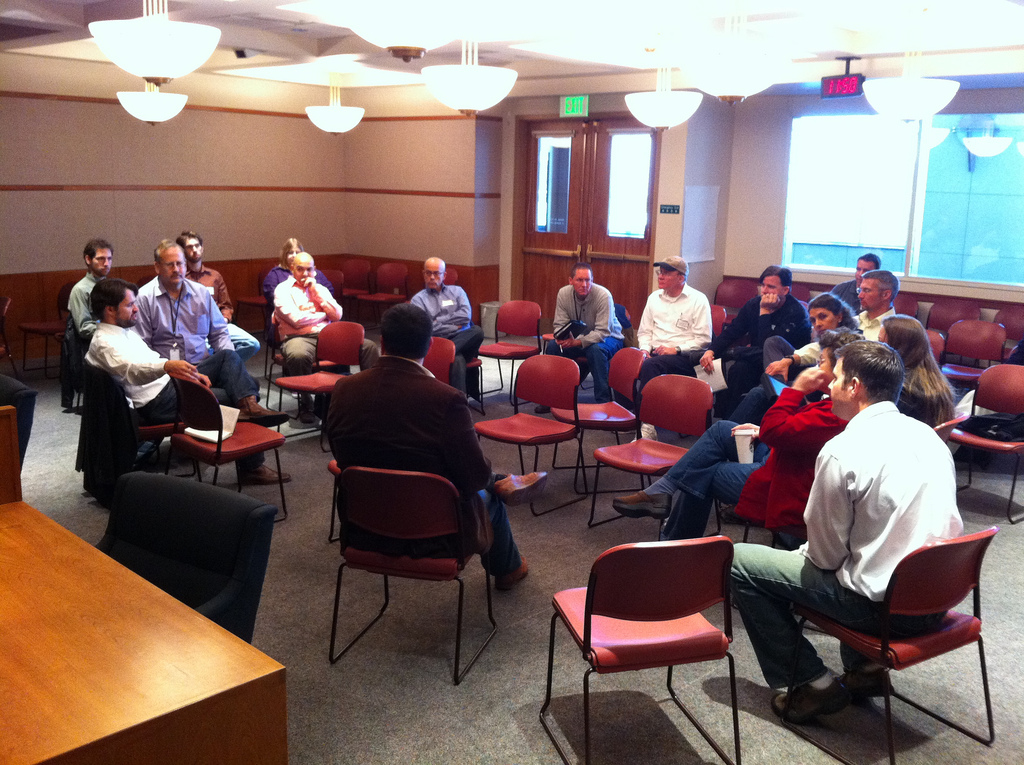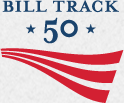CityCamp Colorado 2011 Recap
What: CityCamp Colorado 2011 was an unconference focused on innovation for municipal governments and community organizations.
When: Friday, October 28, 2011
Hashtag: ccCO
Organized by: OpenColorado
—
The 2nd annual CityCamp Colorado was held on October 28, 2011, with about sixty participants from eighteen cities and counties around Colorado, several private IT sector leaders, members of academia, and the engaged public.
Here’s a rundown of how the day went…
Opening Keynote:
CityCamp Colorado 2011 started off with Tom Downey and Stephanie O’Malley from the City of Denver setting the stage for the day’s theme: enhancing access to government. Read more at OpenSource.com’s blog post of the event: Tom Downey on The Power Shift Effect of Open Government and Stephanie O’Malley on Combatting Duplication with Open Government.
Ignite:
There were eight presenters in this year’s installment of CityCamp Colorado Ignite, and they covered a variety of topics.
- The Myth and Reality of Innovation - Brian Gryth
- What would happen if… - Karen Suhaka
- State of Colorado, Data Sharing - Case Studies - Barrett Blank
- Connecting Citizens and Policy - Scott Primeau
- Beyond Technology: Strategies to effectively engage citizens online - Chris Haller
- Connecting the government with the governed, and the governed with each other - Jeff Mooney
- Collaboration – One Piece of the Puzzle - Tammi Dorsey
- Attitude…is a choice - Andy Atencio
Breakout Sessions:
- Open Data Licensing
- Mobile Apps v Website Apps
- Access and Privacy
- Best Practices - Past, Present, and Future
- High Value Data
- Crowdsourcing
- Shared Service Data
- Sustainable Collaboration
- Revenue
- Streamlining Bureaucracy
- Apps for Colorado
- The Digital Divide
- Recruiting and Retaining Great Staff
- Improving Communications
- Launching a Data Catalog Using OpenColorado.org
- Promoting the Model Local Open Government Directive
- Culture Change and Code for America Effect
- The New RFP - Request for Partners
- Planning the Next CityCamp
Photos:
View and download the the CityCamp Colorado 2011 photos on the OpenColorado Flickr
account.
Notes:
Open Data Licensing (Leslie Labrecque - City of Boulder):
- Best practice is to tell people what they can do with the data
- Arvada is using the Creative Commons 0 licensing
- Some organizations (in California) are using Google Fusion tables to store data they want to share
- DataSF has a terms of use policy we can borrow language from
- OpenColorado has 50 different licenses to choose from
- We need to agree on either a standard license or standard terms of use language
Open Data Licensing (Tom Charkut - City of Lakewood):
- Disclaimer is risk mgmt. tactic in case of lawsuit.
- Think about value added versus take data and resell
- Think of data types and ways to publish data
- License type is public then fully open
- If people use it, and resell it then it creates jobs that are potentially more sustainable than the basement style app
- Creative commons license is copyright license which data is not considered copyrightable material
- Would like to at least have some terms for risk mgmt. tactic
Terms
Colorado law
Jefferson
High Value Data (Leslie Labrecque - City of Boulder):
What defines high value data? Some suggestions:
- high use data
- Data mashed with other data to make high density data
- Accurate and up-to-date data
Sunshine ranks data sets by transparency at sunshinereview.org
We need good visualization tools.
Standards can slow things down.
It would be interesting to compare commonly requested files from each of our records offices to find similarities
If you put the data out there in a non machine-readable format and someone wants to use the data they will find a way to convert it.
You can have users help determine high value data but providing a rate this data set and comments boxes.
High Value Data (Steve Moore - Larimer County):
- What is high value data?
- Who determines what value is?
- Existing data that is easy to produce. Already on web site.
- SunshineReview.org rates governments on transparency.
- Suggest a dataset feature on website.
- Ask staff what people ask for.
- Open records requests.
- Put everything out there. It’s all public data.
- What metrics are there to analyze access?
- Publish these metrics on website to see what data the public is using.
- Common way cities categorize crime which makes crime data easy to analyze and compare to other cities.
- Location data is easy to integrate into apps.
- Accurate data is important. Don’t just post once then forget.
- Comments on the data itself are useful to users. Quality of data. Update frequency.
- Think about making data available as your developing internal applications.
- Are there commonality/standards to the format/content of published data across organizations to make data easy to integrate by developers?
- The standards develop as people use the data and the most common usage emerges.
- Many times the community will convert the locally formatted data into a format usable by developers.
- Arvada: crime, building, financial data are most popular (guestimate)
- Colorado: projects related to jobs created and tax revenues.
- That which public perceives as proactive government and increased transparency.
- Opendata.socrata.com shows popularity of their datasets.
Crowdsourcing (Leslie Labrecque - City of Boulder):
Some examples of crowdsourcing tools: kickstarter.com or donorschoose (both are ways to crowdsource funding)
UserVoice is free for public engagement
Omaha uses crowdsourcing at Omaha insight
Google places is a bad example of crowdsourcing because enough people can change an address even if it’s not to the right address
Google maps is a good example of crowdsourcing such as the FourMile Canyon Fire
You can do a Google search for User Voice Case studies for examples
Sustainable Collaboration (Leslie Labrecque - City of Boulder):
How do you keep people engaged?
Listservs have been successful for many projects.
No one had done a listserv with both government and city employees on it
How could a government add to their website a way to send users information on all the areas they are interested in? RSS feeds could be used but want a way to send all subscriptions in a digest format. (Subscribers could organize into a folder on their RSS reader.)
Can you outsource essential services to the cloud to free up time?
Apps for Colorado (Michele Hovet - City of Arvada):
Do we do an app contest? Is it really sustainable?
What about Hack-a-thon?
Look at highly requested data set – marijuana sites
What about CORA requests for all jurisdictions
How do you start with hack-a-thons? Maps on walls? Processes. Set a goal for the event.
Weekend events – Open Colorado can help with $ - get food and space
Sustainability for this? How do you keep it going.
You need awareness and education around this –
Is the data available? Is enough data available? Is it in the right format?
Maybe a design-a-thon to come up with API – maybe not create it?
CORA is one idea – what else?
- Give them data sets and see what they come up with?
- How do we do data standards and structures across Colorado?
- Then it can be re-used and replicated
- Ask citizens what they want – survey them
- Work with “meet ups” – tap into entrepreneurs
- Visualization contests – create graphics
- Work with State Web provider and have them help or provide them the developed app for sustainability
- Stumble safety idea
- Map of fire stations in state and found avg resp times – created an app called will it burn – put in your address and see
- Use twitter API with enabled location – who is my rep or senator for districts
- Tech stars bunker in Boulder – throw some ideas down to them – but need data to use first
- Invite database guys – have them help too
Action item –
Success stories – NYC – PDF map and it took all site down from traffic – someone
Data sets
Idea-a=thon or sponsor infographic contest on idea from data that is available on the site. Cash prizes for teams with best ideas by the end of the day with proto type. Teams formed during city camp. Look at Raleigh CityCamp
Have a hack-a-thon with city camp next time.
Improving Communications (Scott Primeau, Open Colorado):
The behind this topic was “Governments write excessively (white papers, Web content, forms, instructions, etc.) and the readability and quality of govt publications is sometimes questionable. How can governments improve their communications? Plain writing; a personal, informal style; employ professional writes; create citizen review groups; etc?”
The discussion started with the idea that government needs to write more clearly and needs to tell people what they need to do, without sending them in circles.
Some ideas were:
- Use multiple channels (website, e-mail, RSS, text messages, Facebook, Twitter)
- Follow the 5-55-5-55 Rule
- You should be able to deliver meaning in 5 seconds.
- More meaning should be possible within 55 seconds.
- Additional information should be available for people willing to spend 5 minutes reading.
- In depth information should be available within about 55 minutes of reading.
- Most importantly, government needs to add value to communications before they are sent.
Adding value to communications would mean:
- Funneling communications through a central value adding layer
- Combining related communications into one message
- Incorporating standards, sharing & voting, GIS information, and other data
Often, content creators are responsible for sending their own content. This can result in incomplete and duplicative communications. Incorporating a value adding layer may force some content creators to give up control, but it would improve the quality of communications.
This value adding layer would be a form of PIO on steroids.
Here’s a visual of this communication reformation.
Promoting the Model Local Open Government Directive (Scott Primeau, Open Colorado):
The Model Local Open Government Directive was started during the first CityCamp Colorado and published in January 2011. Since then, the Local Open Government Directive has been adopted in Cook County, Illinois, has been promoted in San Francisco, and has reached the Raleigh, North Carolina, city council.
The next goal for the Local Open Government Directive is local adoption in Colorado. Achieving local adoption will need a grassroots type of effort to identify and reach out to local government leaders—directors, managers, policy makers, other non-IT supporters. Reaching out to news outlets, community groups, and elected officials will also support the effort.
When promoting the directive, it is important to highlight the simple benefits of open government. For example, “If your city publishes responses to open records requests, you will save resources on processing future requests.”
Finally, the Model Local Open Government Directive is just a model. Local governments can adopt as many pieces of the directive as work for them. If a local government wants to take a smaller step first, there is also a Declaration of Open Government Principles available to serve as a policy guiding first step.
Thank you to the sponsors who CityCamp Colorado possible:


![]()
Tags: apps, ccco, CityCamp, CityCamp Colorado, data, gov20, ignite, open government, open government directive, open government initiative, unconference



